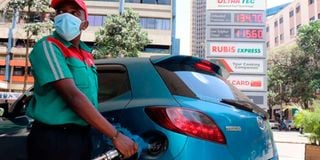Unga, bread...fuel? Why Kenyans are on edge over pump price review

An attendant fuels a car at a filling station. Epra’s move to advertise the fuel marking tender sparked internal fights between state agencies that were finally settled in the Harambee House boardroom.
Kenyans are waiting with bated breath as the energy regulator prepares to review fuel prices later today, with fears that costs could hit historic highs starting at midnight unless the government intervenes again and applies subsidies.
The Energy and Petroleum Regulatory Authority (Epra) and other state entities will have to make a tough choice between increasing fuel prices for the first time since September or absorbing the higher import costs.
Epra has not changed fuel prices since September, when it raised the prices of a litre of petrol to a record Sh134.72, diesel to Sh115.6 and kerosene to Sh110.82, sparking public outrage that forced Parliament to move a bill to slash taxes and levies on the product.
Global Brent crude oil prices have skyrocketed in recent weeks following international supply chain disruptions due to Russia’s invasion of Ukraine last month, with a barrel of crude oil hitting $139.13 on March 7.
The National Treasury has virtually exhausted the Petroleum Development Levy Fund (PDLF), from which it has been drawing to compensate oil marketing companies after cutting their margins to cushion consumers from high fuel prices.
The fund is supported by billions of shillings raised from fuel consumers through the Petroleum Development Levy (PDL), which was increased to Sh5.40 on each litre of petrol and diesel in July 2020 from Sh0.40, a 1,250 per cent rise.
Last month, Ministry of Petroleum Principal Secretary Andrew Kamau told lawmakers that the kitty had only Sh1.27 billion remaining, too little to subsidise fuel prices.
“The low collection of PDL is still a challenge in controlling fuel prices,” said the PS when he was asked whether the money collected is sustainable to keep fuel prices stable in the long term.
The Treasury requires about Sh10 billion to compensate fuel suppliers in order to maintain current fuel prices for at least one more month.
But to underline what could befall consumers if the subsidy is discontinued, Epra said in last month’s review that petrol prices would have increased by Sh14.53 per litre had the subsidy not been applied, a record high.
That would have seen it retail at Sh144.25 per litre at the pump.
Meanwhile, diesel and kerosene, the energy regulator said, would also have hit historic highs of Sh133.89 and Sh119.42 for the same quantity after increasing by Sh23.29 and Sh15.88 respectively.
Higher fuel prices would hit consumers hard through higher fares and transportation charges, which would in turn increase the cost of goods and services.
Fuel is also a key component in generating thermal electricity at a time drought and low steam availability have reduced the generation of hydro and geothermal power, which would significantly increase the prices of electricity.
Higher fuel prices would come as Kenyans face increased costs of other basic commodities such as wheat and maize flour after the war in Ukraine impacted global supply chains, with the prices of flour jumping 10 per cent last week.
Ukraine is a major exporter of wheat to Kenya.
Inflation data from the Kenya National Bureau of Statistics (KNBS) released late last month shows the cost of staple foods such as a kilo of sifted maize flour rose by 2.32 per cent over the previous month, that of a 400-gram loaf of bread by 1.21 per cent and cooking oil by 5.2 per cent.





